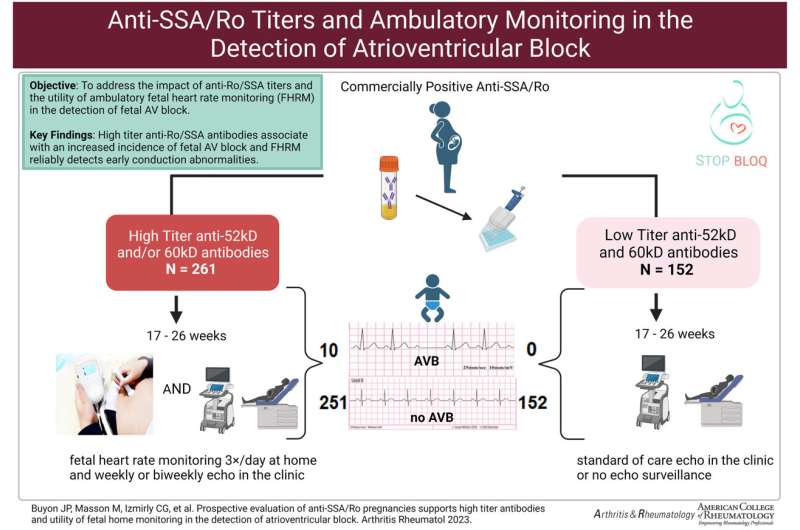This article has been reviewed according to Science X's editorial process and policies. Editors have highlighted the following attributes while ensuring the content's credibility:
fact-checked
trusted source
proofread
Clinical trial targets fetal heart disorder detection in pregnant women

Some individuals with anti-Ro/SSA antibodies (anti–Sjögren's-syndrome–related antigen A autoantibodies, also called anti-Ro antibodies) have autoimmune diseases such as lupus or Sjögren's syndrome, but many have no symptoms.
A clinical trial published in Arthritis & Rheumatology has found that high levels of these antibodies in pregnant women are associated with fetal atrioventricular block (AVB), which occurs when inflammation and subsequent scarring prevent electric signals from the heart's atria from reaching the ventricles. The disease is associated with life-long pacing and can be fatal.
In the trial, called Surveillance To Prevent AV Block Likely to Occur Quickly (STOP BLOQ), the incidence of AVB increased with higher levels of anti-Ro/SSA antibodies, reaching 7.7% for those in the top quartile, which increased to 27.3% in those with a previous child who had AVB, although participant numbers in that category were small. Antibody titers did not change over time. The trial also revealed that home-based fetal heart rate monitoring reliably detected conduction abnormalities, which may reduce the need for serial echocardiograms.
"Examining the levels of anti-Ro/SSA antibodies is an important advance since for women with low titers, monitoring is probably not necessary and for those with high titers the increased risk supports surveillance," said corresponding author Jill Buyon, MD, of NYU Langone Health. She added that this study also indicated that titers of antibodies do not change and that additional factors besides antibodies contribute to risk.
"That home monitoring can rapidly and accurately identify early fetal conduction disease is a major step forward that may significantly decrease the need for echocardiograms and hopefully facilitate reversibility," added senior author and research professor Bettina Cuneo MD, of the University of Arizona-Tucson College of Medicine.
More information: Jill. P. Buyon et al, Prospective Evaluation of High Titer Autoantibodies and Fetal Home Monitoring in the Detection of Atrioventricular Block Among Anti‐SSA/Ro Pregnancies, Arthritis & Rheumatology (2023). DOI: 10.1002/art.42733


















